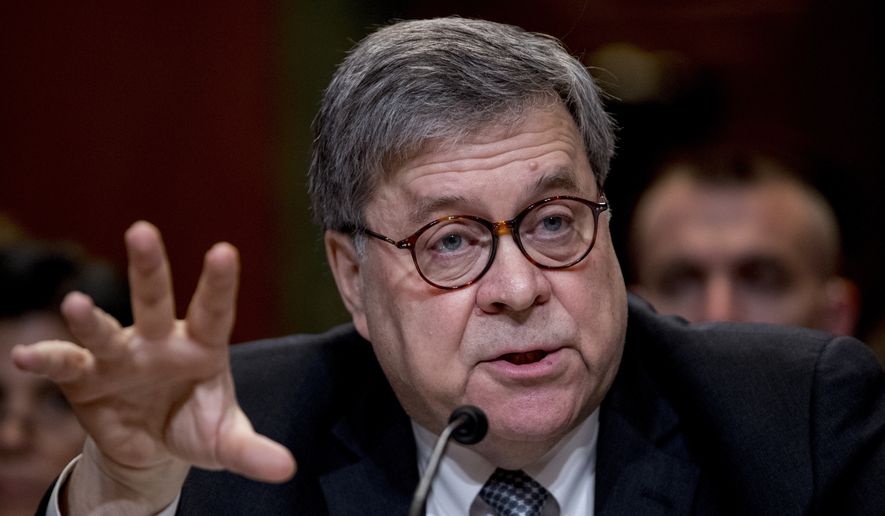Attorney General William P. Barr said Wednesday that under the Obama administration, the FBI did spy on President Trump’s campaign — though he said he has yet to conclude whether the actions were legal and correct.
Speaking to senators during a budget hearing, Mr. Barr also questioned the decision to hide the FBI’s counterintelligence investigation from Mr. Trump. He said the normal practice is to make people aware when their underlings are being investigated.
Mr. Barr said he wants to review how the Obama administration handled the spying and determine whether the reasons were legitimate.
“I think spying did occur,” he told the Senate. “The question is whether it was adequately predicated.”
His statement sent shock waves through Capitol Hill.
Senate Minority Leader Charles E. Schumer, New York Democrat, said claims of “spying” were reckless.
“AG Barr must retract his statement immediately or produce specific evidence to back it up,” Mr. Schumer said in a message on Twitter. “Perpetuating conspiracy theories is beneath the office of the attorney general.”
Mr. Barr told Congress on Tuesday that he was reviewing the Justice Department’s move to use the Foreign Intelligence Surveillance Act, or FISA, to obtain a secret wiretap warrant on a Trump campaign figure and other department decisions surrounding the Republican Party’s presidential nominee.
Pressed Wednesday, he confirmed the review and said the Obama administration was technically spying because it used a secret warrant to obtain a wiretap. He said he will review whether the wiretap warrant was a correct use of the government’s power but has some skepticism.
“I think spying on a political campaign is a big deal,” he said, pointing to the outcry during the Vietnam War era over government snooping on anti-war protesters and the rules that were put into place to control that sort of spying. “I’m not suggesting that those rules were violated, but I think it’s important to look at that.”
At the White House, Mr. Trump cheered Mr. Barr’s plans to find out why the FBI and Justice Department were targeting him in 2016. He said it was time to “fight back” against a treasonous attempt to invalidate his election.
“This was an attempted coup, an attempted takedown of a president,” Mr. Trump told reporters. “And we beat them. We fight back … because I knew how illegal this whole thing was.”
Mr. Trump said he saw a “hunger” in the country for answers.
Mr. Barr said he will look at information already gathered for other investigations, including an ongoing inspector general’s examination of the FBI’s use of a FISA warrant on onetime Trump adviser Carter Page and on congressional probes. U.S. Attorney John Huber of Utah also was appointed to investigate the FBI and Justice Department, though Mr. Barr didn’t mention that probe by name.
Both Democrats and Republicans asked Mr. Barr what he saw that concerned him. He said there was “a basis for my concern,” but he declined to go into more detail.
He did say he thought the Obama administration’s handling of the investigation was curious because Mr. Trump’s team should have been made aware that someone within his orbit had been targeted as a possible foreign operative.
“I don’t understand why the campaign was not advised,” he said, pointing out that two former U.S. attorneys — Chris Christie and Rudolph W. Giuliani — were associated with the campaign and could have been properly alerted.
Rep. Adam B. Schiff, California Democrat and chairman of the House Permanent Select Committee on Intelligence, has been one of Mr. Trump’s fiercest critics. He called Mr. Barr’s claims an insult to FBI and Justice Department employees.
“This type of partisan talking point may please Donald Trump, who rails against a ’deep state coup,’ but it also strikes another destructive blow to our democratic institutions,” Mr. Schiff said.
Sen. Mark R. Warner, the senior Democrat on the Senate Select Committee on Intelligence, said Mr. Barr was mischaracterizing procedure. Mr. Warner said the FBI had ample evidence that Russians were trying to infiltrate the Trump campaign.
“Giving a wink and a nod to this long-debunked ’spying’ conspiracy theory is irresponsible,” he said.
Mr. Barr planned to go to Capitol Hill this week to discuss Mr. Trump’s proposed budget for the Justice Department, but Democrats turned both hearings into inquiries about his handling of special counsel Robert Mueller’s 22-month investigation into Mr. Trump and the 2016 election.
Mr. Barr said he will deliver a public version of the report, with sensitive materials redacted, within the week. He will then work with Congress on another version that could reveal some of the sensitive classified information to them — though it would not be available to the public.
The attorney general said the redactions “cut both ways” in terms of helping or hurting the subjects of the investigation.
Mr. Trump said he has not been given a copy of the report.
“As far as I’m concerned, I don’t care about the Mueller report,” the president said. “I have not seen the Mueller report. I have not read the Mueller report. I have been totally exonerated. I won.”
• Dave Boyer can be reached at dboyer@washingtontimes.com.
• Stephen Dinan can be reached at sdinan@washingtontimes.com.




Please read our comment policy before commenting.